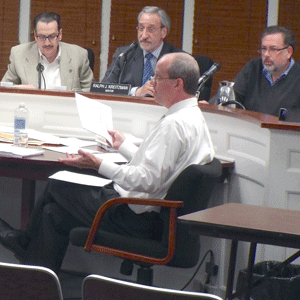 According to the state, even if The Village of Great Neck didn’t raise taxes at all this year, it would still exceed the tax cap.
According to the state, even if The Village of Great Neck didn’t raise taxes at all this year, it would still exceed the tax cap.
But the village board did not let that apparent absurdity stand in the way of unanimously approving a 2014-2015 budget last week after a public hearing at Village Hall.
In a prepared eight-page budget message distributed at the lightly attended meeting, Mayor Ralph Kreitzman said that the average yearly increase for homeowners would be about $181.00. The average tax bill will be $2,112.
“We’ve been very frugal over the years,” he explained. “We don’t ever want to increase taxes. We increase taxes only as much as we have to.”
The new budget, at a little more than $13 million ($13,108,692), shows an increase of just over $730,000 for the fiscal year beginning on June 1. Kreitzman cited steadily rising costs of employee health benefits, pensions, bonding payments and ambulance services as hampering village efforts to dampen costs.
There were no objections from the few residents in attendance, only requests for clarification of items in the 24-page budget handout.
Kreitzman stated that the state’s calculations regarding the tax cap were irrelevant and due to the circumstances surrounding the village’s connection to the new Great Neck Water Pollution Control District system this past December.
“The state has a requirement that when you cease to provide a service, they readjust your tax cap number based on what they determine are your savings,” Kreitzman explained, referring to the fact that the village has stopped providing sewer services itself. “We have met with the state and sent them materials three or four times and they came up with a number that is totally irrelevant.”
The State Comptroller’s office has figured that the village would be exceeding the tax cap even if taxes were not increased. The tax cap limits overall growth in the property tax levy to two percent or the rate of inflation, whichever is less. Regardless of how much the cap may be exceeded, a municipality can pass a law to override the cap. Currently, there are no penalties for exceeding the cap.
“What I’m saying is that if we increase taxes by zero dollars, the way they calculate it we would have exceeded the tax cap by eight percent,” the mayor added, further emphasizing his frustration and puzzlement over the state’s figures. “It is therefore a meaningless number and it’s really amazing that they could do that.”
“I will never be able to explain it to anyone’s satisfaction because I don’t understand it myself, but I’d love to share with you the amount of material that we showed to the state to explain to them that every time they came up with a number it was just wrong.”
“It’s actually a disincentive for municipalities to consolidate services because the state apparently does this consistently,” Kreitzman claimed, in reference to how such a consolidation with the Great Neck Water Pollution Control District is negatively affecting the cap, yet is saving residents an estimated $853,000 yearly.
“If we hadn’t gone out of the sewer business, this wouldn’t have happened and we wouldn’t be discussing this at all,” he said. “It’s only because of their calculations. We did the right thing. We did this deal in 2008 before there was a tax cap and I’d do it again.” Though the Village is now connected to the District, there are still expenses connected to the closing down of its own sewer facilities.































